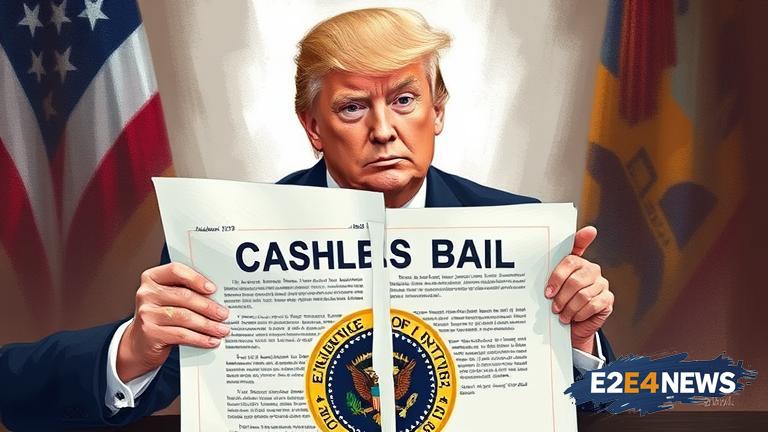The Trump administration has taken a significant step in addressing concerns over public safety and social justice by issuing an executive order aimed at cutting federal funding in jurisdictions that have implemented cashless bail systems. This move has sparked intense debate among law enforcement officials, lawmakers, and civil rights advocates. The order, which was announced recently, targets areas that have adopted cashless bail policies, which allow defendants to be released from jail without paying bail. Proponents of cashless bail argue that it helps to reduce the number of people incarcerated before trial, particularly those who cannot afford to pay bail. However, critics argue that it can lead to an increase in crime rates, as defendants are released back into their communities without sufficient oversight. The Trump administration has cited concerns over public safety as the primary reason for the executive order, arguing that cashless bail systems can put communities at risk by allowing potentially dangerous individuals to be released from jail. The order has been met with resistance from some lawmakers and civil rights groups, who argue that it unfairly targets low-income communities and communities of color. They argue that cashless bail systems are designed to address the issue of mass incarceration and reduce the burden on taxpayers. Despite the controversy, the Trump administration has maintained that the order is necessary to ensure public safety and uphold the rule of law. The executive order has significant implications for law enforcement agencies, which will be required to navigate the new funding landscape. Some agencies may be forced to reduce their budgets or seek alternative sources of funding, which could impact their ability to effectively enforce the law. The order also raises questions about the role of the federal government in shaping local law enforcement policies. While some argue that the federal government has a responsibility to ensure public safety, others argue that it is an overreach of authority. The debate over cashless bail is likely to continue, with some arguing that it is a necessary reform to address issues of social justice, while others argue that it poses a threat to public safety. As the situation continues to unfold, it remains to be seen how the executive order will impact communities across the country. The Trump administration has faced criticism for its handling of social justice issues, and this latest move is likely to further polarize the debate. Despite the challenges, many law enforcement officials and lawmakers are calling for a more nuanced approach to addressing the issue of cashless bail. They argue that a balanced approach is needed, one that takes into account both public safety concerns and social justice issues. The executive order has also sparked a wider debate about the role of bail in the criminal justice system. Some argue that bail is a necessary tool for ensuring that defendants appear in court, while others argue that it is a form of discrimination against low-income communities. As the debate continues, it is likely that we will see further developments in the coming weeks and months. The Trump administration’s move has significant implications for the future of law enforcement and social justice in the United States. It remains to be seen how the situation will unfold, but one thing is certain: the debate over cashless bail is far from over. The executive order has also raised questions about the impact on local economies, as law enforcement agencies may be forced to reduce their budgets. This could have a ripple effect on local businesses and communities, which could be impacted by the reduction in funding. The Trump administration has argued that the order is necessary to ensure that federal funding is being used effectively, but critics argue that it is a heavy-handed approach that fails to take into account the complexities of the issue. As the situation continues to unfold, it is likely that we will see further debate and discussion about the impact of the executive order. The order has also sparked a wider debate about the role of the federal government in shaping local law enforcement policies, with some arguing that it is an overreach of authority. Despite the challenges, many are calling for a more nuanced approach to addressing the issue of cashless bail, one that takes into account both public safety concerns and social justice issues.
